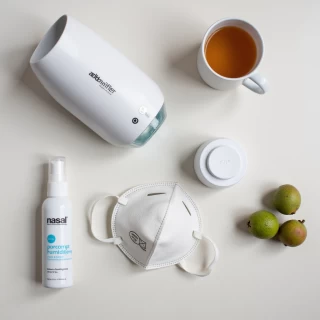
- 4th October 2025
Table of Contents
- What Is H3N2 and Why This Wave Feels Stronger
- Early Warning Signs You Shouldn’t Ignore
- Supporting Your Recovery: What Matters Most
- 1. Rest Deeply, But Move Gently
- 2. Hydration & Liquids That Help
- 3. Smart Food Choices
- 4. Air Quality & Environment
- 5. Supplements & Support (Under Doctor Oversight)
- When to Seek Medical Help Immediately
In recent weeks, doctors across Delhi, Noida, Gurgaon, and surrounding areas have reported a sharp rise in severe flu cases caused by the H3N2 strain. While many may brush it off as a “bad cold,” this variant tends to linger longer and hit harder — especially for those with weak immunity or existing health issues.
In this article, we’ll break down how to recognize H3N2 early, support your body’s recovery (not just suppress symptoms), and stay safer during this flu wave — using practical daily changes and smart food choices, not gimmicks.
What Is H3N2 and Why This Wave Feels Stronger
H3N2 is a subtype of Influenza A. Unlike usual seasonal flu, it mutates more frequently and can produce more intense symptoms, especially during transitional weather periods.
In Delhi-NCR, surveys show that nearly **69% of households** report someone has flu-like symptoms. That’s far higher than earlier months.
Common features that make this wave trickier:
- Symptoms last longer — recovery often takes 10+ days instead of 3–5 days.
- Persistent cough, fatigue, muscle aches even after fever subsides.
- Higher risk of complications (bronchitis, pneumonia) if not managed early.
Early Warning Signs You Shouldn’t Ignore
It’s tempting to dismiss a fever or cold, but with H3N2, acting early helps. Key signs to watch for:
- High fever (≥ 38.5 °C) lasting more than 48 hours without improvement
- Persistent, worsening cough (especially deep or chesty)
- Difficulty breathing, chest tightness, wheezing
- Severe fatigue, body aches, or overwhelming weakness
- Symptoms in vulnerable individuals (children, elderly, chronic disease) that worsen rapidly
Supporting Your Recovery: What Matters Most
Treating H3N2 isn’t just about medicines — your body needs the right conditions to heal. Here are things you can *do* day-to-day:
1. Rest Deeply, But Move Gently
Your body is battling a virus; complete rest helps early on. But once fever reduces, short mild movement (e.g. gentle stretching, walking indoors) helps circulation and lung function. Don’t push — progress slowly.
2. Hydration & Liquids That Help
Drink plenty of water, warm broths, soups, herbal teas. Include soups with easily digestible proteins and vegetables.
3. Smart Food Choices
- Include **anti-inflammatory ingredients** — turmeric, ginger, garlic (if tolerated)
- Soft foods when throat is sore (porridge, khichdi, moong dal)
- Avoid heavy, oily, deep-fried foods which burden digestion
- Use **easily digestible proteins** (lentils, soft paneer, eggs, fish if non-vegetarian)
4. Air Quality & Environment
Delhi’s air is often poor; indoor air purification, vents open early morning, avoid smoke/cold drafts all help. Use humidity if air is too dry.
5. Supplements & Support (Under Doctor Oversight)
- Vitamin D, Zinc, Vitamin C (if not contraindicated)
- Probiotic-rich foods like curd, buttermilk
- Steam inhalation / warm saline gargle
When to Seek Medical Help Immediately
If you see:
- Shortness of breath, chest pain, rapid breathing
- Persistent high fever > 3 days, not improving
- Confusion, dizziness, bluish lips/nails
- Worsening of chronic diseases (diabetes, heart disease, asthma)
In such cases, consult a physician early. Antiviral therapy may help if initiated timely.
If you or a loved one’s recovery feels prolonged, or if you’d like guidance tailored to your health conditions, book a consultation with Dr. Pankaj Kumar. Let’s help you recover better — safely and smartly.














